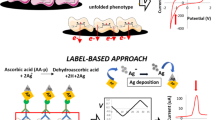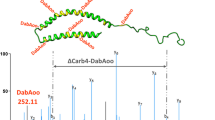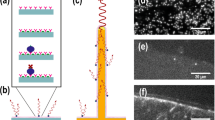Abstract
As the technology is advancing, biotechnologist and pharmacologist seems more interested and focused towards the development of innovative sensing solution/technology capable of evaluating proteins without any limitations of time and cost which were encountered/offered by conventional/traditional methods such as ELISA used for protein quantification. To allow continuous monitoring and attain protein sample information in a non-invasive way, spectrophotometry might be considered as an alternate method which analyzes different conformational states of proteins by closely observing the variation in optical properties of the sample. The work presented studies p53 protein conformational dynamics and their involvement in various pathophysiological and neurodegenerative disease/disorders using the spectrophotometer-based method. By utilizing the technique of spectrophotometry, investigations were carried out on three samples containing varied molecular state of p53 (Wild p53, Denatured p53, and Oxidized p53), to detect the difference in light absorption. Overall, this proposes the possibility of a simple, non-invasive and optical based method capable of detecting and identifying different structural states of p53 while overcoming the complexities offered by the conventional procedures.
Access this chapter
Tax calculation will be finalised at checkout
Purchases are for personal use only
Similar content being viewed by others
References
Suprun, E.V., Shumyantseva, V.V., Archakov, A.I.: Protein electrochemistry: application in medicine. A review. Electrochim. Acta 140, 72–82 (2014). https://doi.org/10.1016/j.electacta.2014.03.089
Svobodova, Z., Reza Mohamadi, M., Jankovicova, B., Esselmann, H., Verpillot, R., Otto, M., Taverna, M., Wiltfang, J., Viovy, J.-L., Bilkova, Z.: Development of a magnetic immunosorbent for on-chip preconcentration of amyloid beta isoforms: representatives of Alzheimer’s disease biomarkers. Biomicrofluidics 6(2), 24126–2412612 (2012). https://doi.org/10.1063/1.4722588
Humpel, C.: Identifying and validating biomarkers for Alzheimer’s disease. Trends Biotechnol. 29(1), 26–32 (2011). https://doi.org/10.1016/j.tibtech.2010.09.007
Levine, A.J.: p53, the cellular gatekeeper for growth and division. Cell 88, 323–331 (1997)
Meplan, C., Richard, M.J., Hainaut, P.: Redox signalling and transition metals in the control of the p53 pathway. Biochem. Pharmacol. 59(1), 25–33 (2000)
Couto, R.A.S., Lima, J.L.F.C., Quinaz, M.B.: Recent developments, characteristics and potential applications of screen-printed electrodes in pharmaceutical and biological analysis. Talanta 146, 801–814 (2016). https://doi.org/10.1016/j.talanta.2015.06.011
Escamilla-Gómez, V., Hernández-Santos, D., González-García, M.B., PingarrónCarrazón, J.M., Costa-García, A.: Simultaneous detection of free and total prostate specific antigen on a screen-printed electrochemical dual sensor. Biosens. Bioelectron. 24, 2678–2683 (2009). https://doi.org/10.1016/j.bios.2009.01.043
Liang, Y.-F., Huang, C.-Y., Liu, B.-D.: A voltammetry potentiostat design for large dynamic range current measurement. In: 2011 International Conference on Intelligent Computation and Bio-Medical Instrumentation (ICBMI), pp. 260–263 (2011). https://doi.org/10.1109/icbmi.2011.44
Uberti, D., Lanni, C., Carsana, T., Francisconi, S., Missale, C., Racchi, M., Govoni, S., Memo, M.: Identification of a mutant-like conformation of p53 in fibroblasts from sporadic Alzheimer’s disease patients. Neurobiol. Aging 27(9), 1193–1201 (2006). https://doi.org/10.1016/j.neurobiolaging.2005.06.013
Illustrated Glossary of Organic Chemistry. http://www.chem.ucla.edu/~harding/IGOC/B/beers_law.html. Accessed 21 Feb 2018
Zhou, J., Rao, X., Tian, J., Wang, J., Li, T.: Study of protein conformation change induced by pH condition using terahertz spectroscopy. In: 2017 10th UK-Europe-China Workshop on Millimetre Waves and Terahertz Technologies (UCMMT), Liverpool (2017). https://doi.org/10.1109/ucmmt.2017.8068501
Gupta, S.D., Kelp, G., Arju, N., Emelianov, S., Shvets, G.: Metasurface-enhanced infrared spectroscopy: From protein detection to ceils differentiation. In: 2017 Conference on Lasers and Electro-Optics Europe & European Quantum Electronics Conference (CLEO/EuropeEQEC), Munich (2017). https://doi.org/10.1109/cleoe-eqec.2017.8086872
Hainaut, P., Milner, J.: A structural role for metal ions in the “wild-type” conformation of the tumor suppressor protein p53. Cancer Res. 53, 1739–1742 (1993)
Méplan, C., Richard, M.J., Hainaut, P.: Redox signalling and transition metals in the control of the p53 pathway. Biochem Pharmacol. 59(1), 25–33 (2000). https://doi.org/10.1016/s00062952(99)00297-x
Méplan, C., Richard, M.J., Hainaut, P.: Metalloregulation of the tumor suppressor protein p53: zinc mediates the renaturation of p53 after exposure to metal chelators in vitro and in intact cells. Oncogene 19 (2000). https://doi.org/10.1038/sj.onc.1203907
Kara, P., de la Escosura-Muñiz, A., Maltez-da Costa, M., Guix, M., Ozsoz, M., Merkoçi, A.: Aptamers based electrochemical biosensor for protein detection using carbon nanotubes platforms. Biosens. Bioelectron. 26, 1715–1718 (2010)
Jeong, B., Akter, R., Han, O.H., Rhee, C.K.: Increased electrocatalyzed performance through dendrimer- encapsulated gold nanoparticles and carbon nanotube-assisted multiple bienzymatic labels: highly sensitive electrochemical immunosensor for protein detection (2013)
Author information
Authors and Affiliations
Corresponding author
Editor information
Editors and Affiliations
Rights and permissions
Copyright information
© 2019 Springer Nature Switzerland AG
About this paper
Cite this paper
Abdullah, S., Serpelloni, M., Abate, G., Uberti, D. (2019). A Novel Technique to Characterize Conformational State of the Proteins: p53 Analysis. In: Andò, B., et al. Sensors. CNS 2018. Lecture Notes in Electrical Engineering, vol 539. Springer, Cham. https://doi.org/10.1007/978-3-030-04324-7_64
Download citation
DOI: https://doi.org/10.1007/978-3-030-04324-7_64
Published:
Publisher Name: Springer, Cham
Print ISBN: 978-3-030-04323-0
Online ISBN: 978-3-030-04324-7
eBook Packages: EngineeringEngineering (R0)




